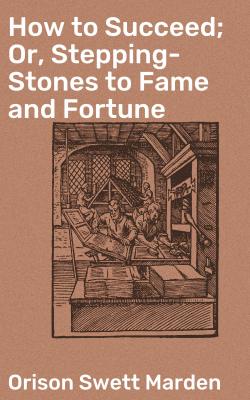ТОП просматриваемых книг сайта:
How to Succeed; Or, Stepping-Stones to Fame and Fortune. Orison Swett Marden
Читать онлайн.Название How to Succeed; Or, Stepping-Stones to Fame and Fortune
Год выпуска 0
isbn 4057664655929
Автор произведения Orison Swett Marden
Жанр Языкознание
Издательство Bookwire
Joseph Hunter was a carpenter, Robert Burns a ploughman, Keats a druggist, Thomas Carlyle a mason, Hugh Miller a stone mason. Rubens, the artist, was a page, Swedenborg, a mining engineer. Dante and Descartes were soldiers. Ben Johnson was a brick layer and worked at building Lincoln Inn in London with trowel in hand and a book in his pocket. Jeremy Taylor was a barber. Andrew Johnson was a tailor. Cardinal Wolsey was a butcher's son. So were Defoe and Kirke White. Michael Faraday was the son of a blacksmith. He even excelled his teacher, Sir Humphry Davy, who was an apprentice to an apothecary.
Virgil was the son of a porter, Homer of a farmer, Pope of a merchant, Horace of a shopkeeper, Demosthenes of a cutler, Milton of a money scrivener, Shakespeare of a wool stapler, and Oliver Cromwell of a brewer.
John Wanamaker's first salary was $1.25 per week. A. T. Stewart began his business life as a school teacher. James Keene drove a milk wagon in a California town. Joseph Pulitzer, proprietor of the New York World, once acted as stoker on a Mississippi steamboat. When a young man, Cyrus Field was a clerk in a New England store. George W. Childs was an errand boy for a bookseller at $4 a month. Andrew Carnegie began work in a Pittsburg telegraph office at $3 a week. C. P. Huntington sold butter and eggs for what he could get a pound or dozen. Whitelaw Reid was once a correspondent of a newspaper in Cincinnati at $5 per week. Adam Forepaugh was once a butcher in Philadelphia.
Sarah Bernhardt was a dressmaker's apprentice. Adelaide Neilson began life as a child's nurse. Miss Braddon, the novelist, was a utility actress in the provinces. Charlotte Cushman was the daughter of poor people.
Mr. W. O. Stoddard, in his "Men of Business," tells a characteristic story of the late Leland Stanford. When eighteen years of age his father purchased a tract of woodland, but had not the means to clear it as he wished. He told Leland that he could have all he could make from the timber if he would leave the land clear of trees. A new market had just then been created for cord wood, and Leland took some money that he had saved, hired other choppers to help him, and sold over two thousand cords of wood to the Mohawk and Hudson River Railroad at a net profit of $2600. He used this sum to start him in his law studies, and thus, as Mr. Stoddard says, chopped his way to the bar.
It is said that the career of Benjamin Franklin is full of inspiration for any young man. When he left school for good he was only twelve years of age. At first he did little but read. He soon found, however, that reading, alone, would not make him an educated man, and he proceeded to act upon this discovery at once. At school he had been unable to understand arithmetic. Twice he had given it up as a hopeless puzzle, and finally left school almost hopelessly ignorant upon the subject. But the printer's boy soon found his ignorance of figures extremely inconvenient. When he was about fourteen he took up for the third time the "Cocker's Arithmetic," which had baffled him at school, and ciphered all through it with ease and pleasure. He then mastered a work upon navigation, which included the rudiments of geometry, and thus tasted "the inexhaustible charm of mathematics." He pursued a similar course, we are told, in acquiring the art of composition, in which, at length, he excelled most of the men of his time. When he was but a boy of sixteen, he wrote so well that the pieces which he slyly sent to his brother's paper were thought to have been written by some of the most learned men in the colony.
Henry Clay, the "mill-boy of the slashes," was one of seven children of a widow too poor to send him to any but a common country school, where he was drilled only in the "three R's." But he used every spare moment to study without a teacher, and in after years he was a king among self-made men.
The most successful man is he who has triumphed over obstacles, disadvantages and discouragements.
It is Goodyear in his rude laboratory enduring poverty and failure until the pasty rubber is at length hardened; it is Edison biding his time in baggage car and in printing office until that mysterious light and power glows and throbs at his command; it is Carey on his cobbler's bench nourishing the great purpose that at length carried the message of love to benighted India;—these are the cases and examples of true success.
Конец ознакомительного фрагмента.
Текст предоставлен ООО «ЛитРес».
Прочитайте эту книгу целиком, купив полную легальную версию на ЛитРес.
Безопасно оплатить книгу можно банковской картой Visa, MasterCard, Maestro, со счета мобильного телефона, с платежного терминала, в салоне МТС или Связной, через PayPal, WebMoney, Яндекс.Деньги, QIWI Кошелек, бонусными картами или другим удобным Вам способом.

